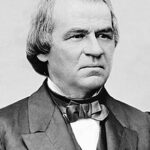The Constitutional Crisis
President Andrew Johnson’s fierce opposition to the 14th Amendment created unprecedented constitutional conflict in 1866. The amendment guaranteed citizenship to formerly enslaved people and equal protection under law. Johnson viewed this as federal overreach that threatened state sovereignty. His resistance put him directly at odds with the Republican-controlled Congress.
Johnson’s Campaign Against Equal Protection
Johnson Opposition 14th Amendment involved active campaigning against ratification in Southern states. He argued the amendment was unconstitutional because Southern states weren’t represented in Congress. The president claimed it would create “mongrel” government and destroy white civilization. His inflammatory rhetoric damaged his credibility with moderate Republicans. ⚠️ Johnson’s language inflamed racial tensions across the nation.
Strategic Political Miscalculation
The president believed his opposition would rally Democratic support for upcoming elections. Instead, his stance alienated moderate voters who supported civil rights progress. Johnson Opposition 14th Amendment became a rallying cry for Radical Republicans. 📊 Republican gains in 1866 midterm elections demonstrated public rejection of Johnson’s position. His campaign speeches were poorly received and often disrupted by hostile crowds.
Impact:
Congressional Relations Deteriorated
Johnson’s opposition severely damaged his relationship with Congress and Republican leadership. Radical Republicans gained momentum for their Reconstruction agenda after his resistance. The conflict set the stage for Johnson’s eventual impeachment proceedings in 1868. 🔥 Constitutional battles over federal versus state authority intensified throughout his presidency.
Civil Rights Progress Delayed
Presidential opposition slowed ratification efforts and emboldened Southern resistance to civil rights. Johnson Opposition 14th Amendment encouraged former Confederate states to reject constitutional changes. His stance legitimized white supremacist arguments against equal protection. The delay in ratification prolonged uncertainty about African American citizenship rights. 📉 Progress toward racial equality faced significant setbacks during this period.
Historical Legacy Damaged
Johnson’s opposition positioned him on the wrong side of constitutional history. Modern historians view his stance as a major failure of presidential leadership. His resistance to civil rights advancement damaged his historical reputation permanently. The controversy contributed to his ranking among America’s worst presidents. 🌍 International observers criticized America’s failure to fully embrace equality after Civil War victory.
